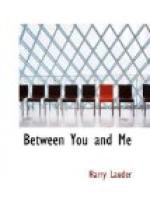You maun work i’ this world. If your siller comes tae you too easily, you’ll gain nae pleasure nor profit frae the spending on’t. The things we enjoy the maist are not those that are gi’e’n to us; they’re those that, when we look at, mean weeks or months or maybe years of work. When you’ve to work for what you get you have the double pleasure. You look forward for a lang time, while you’re working, to what your work will bring you. And then, in the end, you get it—and you know you’re beholden tae no man but yourself for what you have. Is that no a grand feeling?
Aweel, it’s no matter. I’m glad for the laddies to hae their fun wi’ me. They mean no harm, and they do no harm. But I’ve been wishfu’, sometimes, that the American reporters had a wee bit less imagination. ’Tis a grand thing, imagination; I’ve got it masel, tae some extent. But those New York reporters—and especially the first ones I met! Man, they put me in the shade altogether!
I’d little to say to them the day I landed; I needed time tae think and assort my impressions. I didna ken my own self just what I was thinking aboot New York and America. And then, I’d made arrangements wi’ the editor of one of the great New York papers to write a wee piece for his journal that should be telling his readers hoo I felt. He was to pay me weel for that, and it seemed no more than fair that he should ha’ the valuable words of Harry Lauder to himself, since he was willing to pay for them.
But did it mak’ a wee bit of difference tae those laddies that I had nought to say to them? That it did—not! I bade them all farewell at my hotel. But the next morning, when the papers were brought to me, they’d all long interviews wi’ me. I learned that I thought America was the grandest country I’d ever seen. One said I was thinking of settling doon here, and not going hame to Scotland at a’ any more! And another said I’d declared I was sorry I’d not been born in the United States, since, noo, e’en though I was naturalized—as that paper said I meant tae be!—I could no become president of the United States!
Some folk took that seriously—folk at hame, in the main. They’ve an idea, in America, that English folk and Scots ha’ no got a great sense of humor. It’s not that we’ve no got one; it’s just that Americans ha’ a humor of a different sort. They’ve a verra keen sense o’ the ridiculous, and they’re as fond of a joke that’s turned against themselves as of one they play upon another pairson. That’s a fine trait, and it makes it easy to amuse them in the theatre.
I think I was mair nervous aboot my first appearance in New York than I’d ever been in ma life before. In some ways it was worse than that nicht in the old Gatti’s in London. I’d come tae New York wi’ a reputation o’ sorts, ye ken; I’d brought naethin’ o’ the sort tae New York.
When an artist comes tae a new country wi’ sae much talk aboot him as there was in America concerning me, there’s always folk that tak’ it as a challenge.




